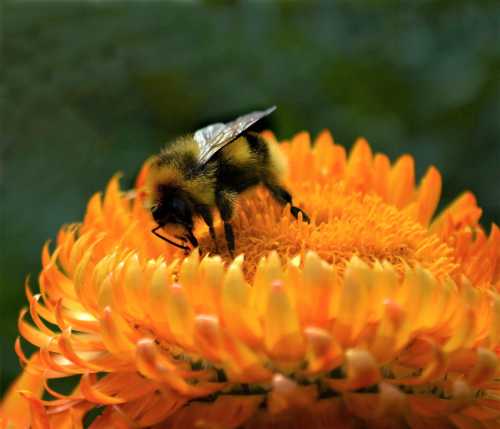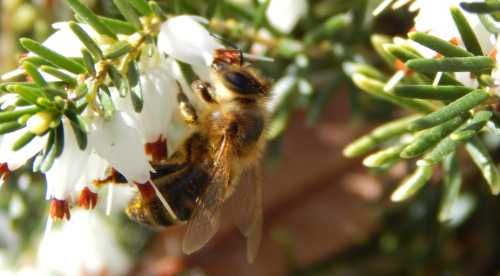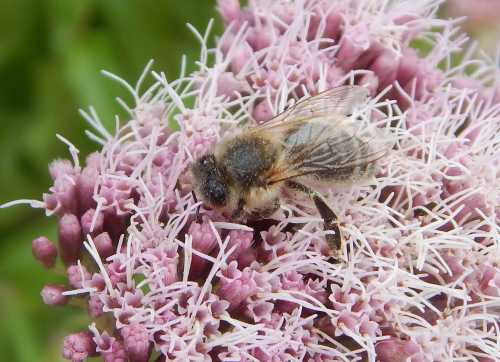Bees For Sale?
Updated: 1st March 2021
Note.....if you are a beekeeper wanting the page for honey bees click here. If not, read on...
Not long ago, whilst we would see honey bees for sale to beekeepers, species that were only seen in the wild previously (bumble bees and solitary bees) were not offered. Purchasing honey bees in order to establish a new colony in a bee hive is of course very common practice.
However, it is now possible to purchase bees that previously reproduced only in the wild environment. In other words, they are now being bred commercially by humans for pollination. This is a relatively new development.
Why Are We Now Seeing 'Wild' Bees For Sale?
The fact is that many solitary bees
(such as Orchard Mason Bees) and bumble bees are excellent pollinators.

A company called Koppert began rearing bumble bees for sale and commercial pollination in the 1980s, after it became recognised that bumble bees were, through their ability to buzz pollinate, the most efficient pollinators of tomatoes.
More and more research is being conducted into pollination by other solitary species too, such as mason bees and leafcutters.
According to the US Agricultural Research Service, 1 alfalfa leafcutter bee can do the job of 20 honey bees. You can read more about that on my page about leafcutter bees. Further information is also available on my pages about bee pollination.
It seems, however, that increasingly, and with the troubles experienced
by honey bees through Colony Collapse Disorder and so on, the rearing of
bumble bees and solitary bees for sale and commercial use is increasing.

As farmers and governments become increasingly concerned about relying so heavily on one species of bee (i.e. the honey bee) for crop pollination, more efforts are being made to 'manage' and commercially produce other species.
Is It A Good Thing To See Bumble Bees And Solitary Bees For Sale?
You might think that I would be pleased about this development. Actually I feel uneasy about it, for the following reasons:
- I suggest that rearing other bees as a back-up for providing a
pollination service, is really a sticking plaster approach to solving a
problem in the environment.
I believe we should first ask ourselves what these man-made problems are, then address them honestly and responsibly, and in a way that is sustainable and healthier for the environment as a whole. If we look after the environment and work with nature rather than against her, then pollinators should be able to flourish, and continue pollinating our crops and landscapes freely. - Insufficient controls have resulted in the
shipping around of commercially reared bumble bees in the USA, with knock on effects for other species.
Apparently, some suppliers of bumble bees for pollination, aim to get around potential problems by rearing ‘native bees’ overseas, then shipping them back to their country of origin. This scenario is happening in the UK, and unfortunately, research has revealed there is a risk they could spread diseases to wild bees. - I do wonder whether it would suit the agrichemicals industry, if solitary and bumble bees are used in
crop pollination instead of honey bees.
Why?
Solitary bees and bumble bees, have shorter life cycles than honey bee colonies (in other words, they are expected not to live for as long as honey bees).
Instead of the honey bee pollination service which may be hired, presumably, the solitary and bumble bees can be purchased and replaced yearly. Who then, will be alerted to the effects of pesticides?
Honey bee colonies, by contrast, are meant to survive beyond a mere pollination season. Without beekeepers to raise the alarm, (as they have in the UK, USA, Germany and France, for example), I do wonder if the pesticide companies can get off too lightly. Honey bees also produce honeycomb and pollen - products which can be analysed and monitored for toxins.
It's very important to realise that, for a whole host of reasons, honey bees are the 'canary in the mine' more than any other insect, and as such, they are a vital indicator of the health of our planet. Read more about why honey bees matter. They are of course, also enchanting species in their own right. - I really do not like the way humans have a habit of
disregarding the lives of small creatures as unimportant and
dispensable, rather than address the problems in the environment created by humans.
It is not that I am against the very notion that wild bees should pollinate our food crops. My point is, that if conditions in the environment are good, wild bees and other insects will do this freely in any case.
We will not solve environmental problems unless we actually address the causes of them!
And
so you see, although I can understand the rationale of breeding bees
for sale to pollinate our crops, I also wonder whether they help to
delay the crucial action we need to take to address our problems, under
the guise that all is well, we can get by, just through breeding a few
extra bees. I think this is incredibly naive, and a very shoddy way to
treat our environment.
Conservationists call for better testing of insecticides, which inevitably means testing insecticides on bees.
During this process, some bees may die.
Is it okay to kill bees in order to test insecticides?
